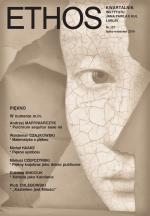 zobacz powiększenie | DOI 10.12887/32-2019-3-127-15 Maria Gołębiewska − The Subject of Intentions and Lived-Experiences: Receptivity of the Subject and Aesthetic Evaluations according to Nicolas Malebranche Cena brutto: 7,00 PLN za szt. |
|
The category of receptivity of the subject overpasses a simple alternative of the notions of activity and passivity. In his ontological theses (and especially in his anthropological ones) Nicolas Malebranche addresses the issue of receptivity, going beyond the concept of an absolutely active subject. Historians of philosophy claim that the aforementioned theses anticipate the later considerations regarding receptivity developed, e.g., in phenomenology. Malebranche’s conception of receptivity concerns, among others, the status of sensual impressions as the basis of cognitive evaluations, as well as evaluations that may be described, referring to the ancient Greek category of ‘aisthesis,’ as aesthetic evaluations of sensual impressions: pleasure or resentment related to sensual experience. Adopting the Cartesian principles as his starting point, Malebranche developed the theory of occasionalism in the context of conception of the subject as a combination of body and soul. In my paper, I present Malebranche’s theses pertaining to the concept of the receptive subject—the subject of cognitive processes, as well as of sensual experiences that are submitted to evaluations termed ‘aesthetic.’ According to Malebranche, receptivity exceeds the division between the passive and the active in the human being and in their cognitive processes. Cognition is the starting point for other actions of the subject: ethical judgements (the reason in relation to the will) and aesthetic judgements (the reason in relation to the senses). Jean-Marie Gaonach stresses that the difference, which Malebranche has established between cognition and reception, is strictly related to the difference—indicated by him—between the soul’s two primary faculties, or rather two types of its receptivity, namely, the ‘sense’ and ‘pure understanding.’ He believes ‘sense’ to include, apart from sensuality in its basic meaning, also memory and imagination. Sense presupposes the combination of soul and body, being like a channel through which all communication between us and the external world takes place. It is due to sense that we are able to perceive material things, either via sensuality when they are present, or, when they are absent, via images.
Malebranche proposes a representative theory of perception. He admits that the effects of perception are mental (contained in the soul) representations of sensually perceived objects. Eventually, the result of cognition that begins in sensual perception is an assortment of ideas as mental representations in the soul. Malebranche describes perception in a very broad context: both as sensual perception and as internal perception related to spiritual and psychological states of the human being, and also as an internal perception of ideas in the mind of God. It is emphasized that Malebranche distinguishes between ideas as results of sensual cognition being the basis of scientific cognition and the subject’s internal lived-experiences and reactions.
The philosopher links those lived-experiences to our evaluation of pleasure and resentment above which we should rise in search for the harmony of human faculties and for the harmony of the human and the divine. It is this harmonization, comprehended as a certain order given in cognitive processes and in lived-experience, that Malebranche seems to consider—together with the idea of beauty—as the appropriate criterion of aesthetic evaluations passed by the subject.
Keywords: Malebranche, receptivity, impression, perception, sense, idea, beauty Contact: Institute of Philosophy and Sociology, Polish Academy of Sciences, ul. Nowy Świat 72, 00-330 Warsaw, Poland E-mail: mgolebiewska@ifispan.waw.pl
Phone: +48 22 6572814
Pliki do pobrania: » Golebiewska.pdf | |
